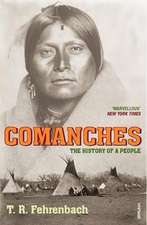The Culture of Colonialism – The Cultural Subjection of Ukaguru
Autor T. O. Beidelmanen Limba Engleză Paperback – 26 iun 2012
Preț: 201.16 lei
Nou
Puncte Express: 302
Preț estimativ în valută:
38.49€ • 40.30$ • 31.85£
38.49€ • 40.30$ • 31.85£
Carte tipărită la comandă
Livrare economică 07-21 aprilie
Preluare comenzi: 021 569.72.76
Specificații
ISBN-13: 9780253002082
ISBN-10: 0253002087
Pagini: 414
Ilustrații: 6 maps
Dimensiuni: 157 x 234 x 29 mm
Greutate: 0.57 kg
Editura: MH – Indiana University Press
ISBN-10: 0253002087
Pagini: 414
Ilustrații: 6 maps
Dimensiuni: 157 x 234 x 29 mm
Greutate: 0.57 kg
Editura: MH – Indiana University Press
Cuprins
PrefaceIntroduction: Colonialism and AnthropologyPart I. Theory and History 1. Kaguru and Colonial History: the Rise and Fall of Indirect Rule Part II. Colonial Life 2. Ukaguru 1957-1958; 3. The Kaguru Native Authority; 4. Court Cases: Order and Disorder; 5. Subversions and Diversions: 1957-1958; 6. The World Beyond: Kaguru Marginality in a Plural World, 1957-1961 Part III. How It Ended and Where It Led Epilogue: Independence and Colonialism ; ConclusionAppendices; Bibliography; Index
Recenzii
"Personal and engaged while trying to make sense of a contradictory and exclusionary world." Ivan Karp, Emory University
"Personal and engaged while trying to make sense of a contradictory and exclusionary world." Ivan Karp, Emory University
"Personal and engaged while trying to make sense of a contradictory and exclusionary world." Ivan Karp, Emory University
Notă biografică
Descriere
Details colonial authority and progress in rural Africa













